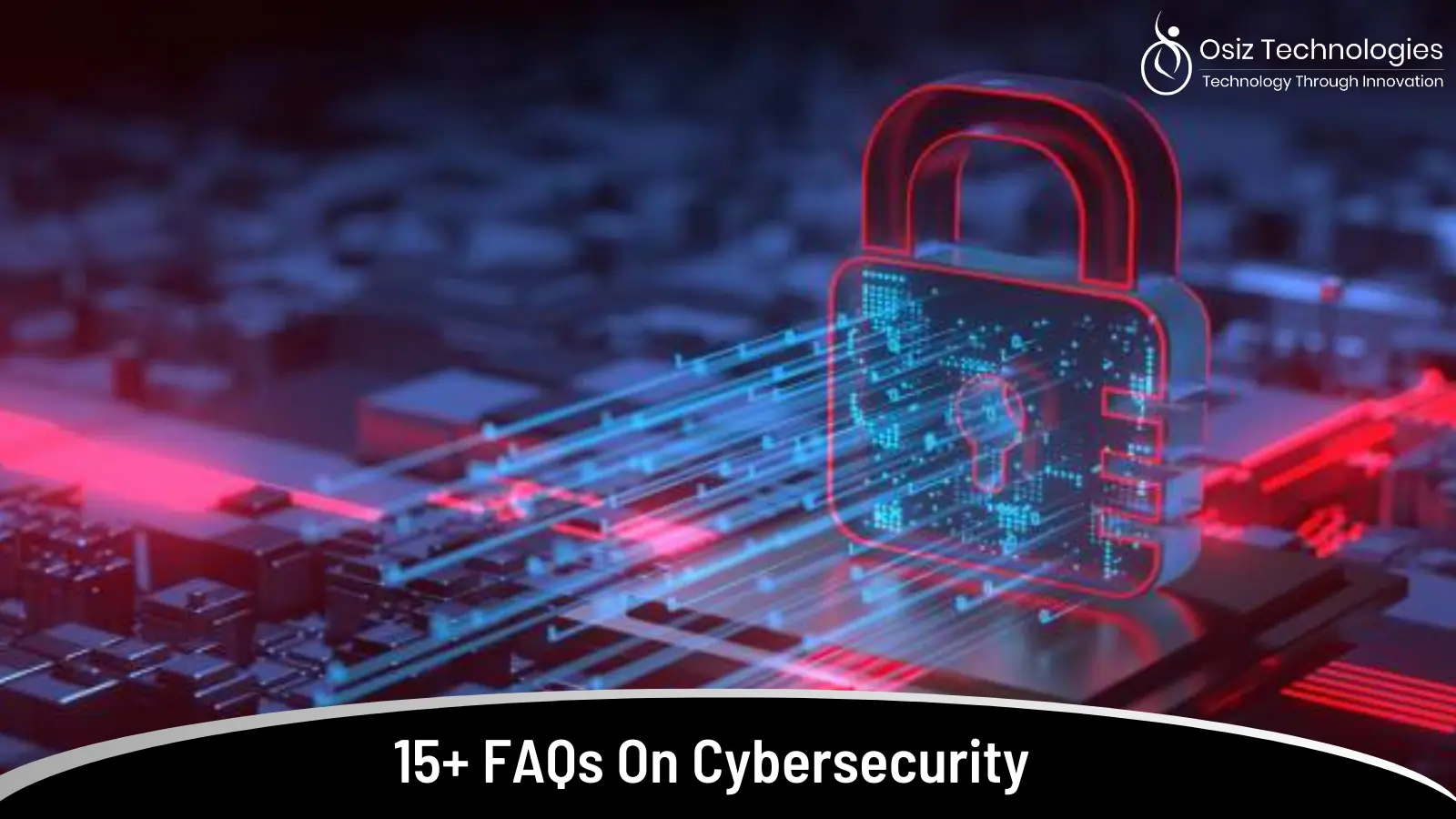The complexity of cybersecurity can be challenging, especially with the evolving nature of cyber threats. In this blog, we address some of the most frequently asked questions (FAQs) on cybersecurity to help demystify this crucial aspect of digital safety. By the way you can understand some common threats to exploring the role of cybersecurity services in protecting businesses. Whether you're a business owner, an IT professional, or simply curious about cybersecurity, this blog aims to provide insightful answers to your burning questions.
15+ Must-Know FAQs On Cybersecurity
1. What is cybersecurity?
As everything is dependent on computers, the cost of victims keeps rising and has the power to destroy the whole business. Hence, it is crucial to protect data with cybersecurity measures. Cybersecurity is a technology to practice for protecting sensitive information from threats.
2. What are the 5 key types of cyber security?
The 5 main types of cyber security are
- Critical infrastructure security
- Cloud Security
- Internet of Things (IoT) security
- Application security
- Network security
3. What services does a cyber security company offer?
Each cybersecurity company offers the following services for end-to-end protection in each business
- Security Monitoring
- Cybersecurity Advisory and Consulting
- Cyber-Physical Security
- Vulnerability Management
- Endpoint Security
- Threat detection and response
- Secure cloud transformation
- Digital workplace security
- Security Infrastructure Management
- Enterprise Security-As-A-Service
- Digital identity management
- Privacy and data protection
4. Which is the Best Cybersecurity Company?
Based on the detailed research, the best and top 5 cybersecurity companies are
5. What is a security consulting firm?
A security consulting firm is a specialized company that provides end-to-end service, expert advice, and guidance to organizations seeking to enhance their security measures. These firms typically offer a wide range of services, including risk assessments, security audits, policy development, security system design and implementation, incident response planning, and security training. Security consulting firms often work with highly skilled cybersecurity professionals with expertise in various aspects of security.
6. What are the solutions for cyber security attacks?
There are a wide range of solutions for cybersecurity attacks, and here is the list of solutions
- Security Service Edge (SSE)
- Extended Detection and Response (XDR)
- Secure Access Service Edge (SASE)
- Malware Protection
- Malware Analytics
- Trusted Access
- Application Security Solutions
- Network Security
- Internet of Things (IoT) Security
- Cloud Security
- AI Transformation
- Generative AI
7. What is the importance of cybersecurity solutions?
With the rising pressure among organizations regarding their data protection, cybersecurity plays a crucial role here. Organizations prioritize cybersecurity solutions to equip themselves and face the challenges of the digital era. Each organization needs to implement cybersecurity solutions in their operations for business growth, boost results and operational excellence.
8. What is a cyberattack?
Cyberattacks can be a significant threat to businesses and are capable of causing disruption, damage, and potentially even destruction. These attacks encompass any deliberate attempt to gain unauthorized access to a network, computer system, or digital device with the aim of stealing, exposing, altering, disabling, or destroying data, applications, or other assets.
9. What is cyber resilience?
Cyber resilience refers to an organization's capacity to prevent, endure, and bounce back from cybersecurity incidents. It's a comprehensive concept that integrates business continuity, information system security, and organizational resilience. This notion embodies the capability to maintain operations and achieve desired objectives even in the face of adversities like cyberattacks, natural calamities, or economic downturns.
10. What is malware?
Malware, or malicious software, is referred to as intrusive software developed by cyber criminals, often referred to as hackers, aiming to destroy or damage computer systems. Common examples of malware encompass viruses, Trojan viruses, spyware, adware, and ransomware. These malevolent programs take various forms like damaging highly, costly to merely annoying, depending on the cybercriminals' aim.
11. Are cybersecurity threats increasing?
Yes, cyber attacks increased across all the industry, with a rise of 221% when compared with attacks in the previous year. Based on the recent report from Truesec, there has been an increase in attacks on many small and medium-sized enterprises over the past few years.
12. How do you build a cybersecurity solution?
It is significant to build a strong cybersecurity solution for every enterprise. Here are the 6 key steps to strengthening your business
- Identify and categorize sensitive information
- Identify Data Storage Locations
- Keep Track of Hardware and Software Inventory
- Provide Training for Employees
- Enforce Multi-Factor Authentication
- Collaborate with Trusted Partners
13. What actions should I take if I suspect a cyberattack?
If you suspect a cyberattack, first identify the threat by assessing unusual activity, and neutralize it by disconnecting devices, changing passwords, and limiting data access. Review the system for damage, restore infrastructure and data carefully, test the system before resuming operations, and report, reflect, and learn for future prevention.
14. Are organizations doing enough to combat cyber threats?
The answer is NO, the study from CISCO says that only 15% of businesses are ready and mature enough to be resilient against cyber threats. It is significant for all enterprises to fight against attacks in the era of digital transformation.
15. What are the Biggest Cybersecurity Challenges Businesses are Facing?
Here is the list of cybersecurity attacks businesses are facing in 2024
- IoT Attacks
- Cloud Attacks
- Cryptocurrency and Blockchain Attacks
- Ransomware Attacks
- Phishing Attacks
- Mobile Banking Malware
- AI Attacks
- Insider Attacks
Closing Thoughts
As we conclude our exploration of cybersecurity FAQs, it's evident that staying informed is the first step towards enhancing digital safety. Cyber threats continue to evolve, making vigilance and proactive measures essential for individuals and businesses alike. Remember, cybersecurity is a shared responsibility, and investing in robust cybersecurity services can provide peace of mind. Stay updated, stay vigilant, and prioritize your digital safety in today's interconnected world.
Listen To The Article












